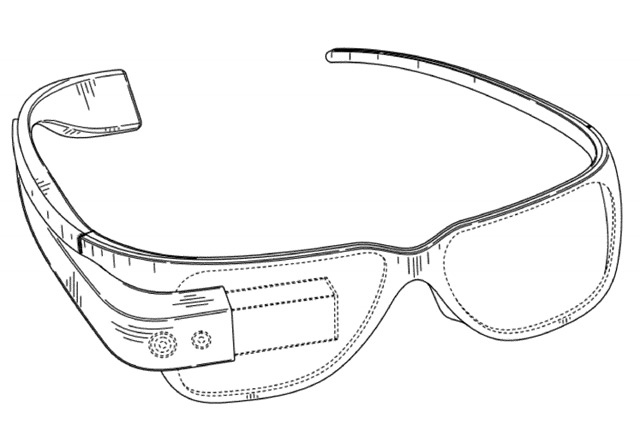 Search large Google has patented the look of its augmented-reality glasses, called Project Glass.
Search large Google has patented the look of its augmented-reality glasses, called Project Glass.Three patents for a "wearable show device" with characteristics of the much-talked concerning futuristic glasses were submitted last autumn.
The patents reference such functions as displaying information in front of the wearer's eyes and enjoying audio.In April, Google revealed details of its analysis into the glasses and showed a demo video of a prototype.The patents show pictures of various versions of augmented reality glasses, some with lenses and a few while not.Cyborg eye Google is functioning on the project in its analysis lab, Google X.The prototypes are currently being tested by the firm's executives, together with Sergey Brin and Vic Gundotra.The demo video showed science fiction-like glasses equipped with a microphone and partly clear little screen right higher than the user's right eye.
 The glasses are said to own several functions of a smartphone Besides displaying data concerning the wearer's surroundings, the glasses were shown to be used to speak with others, browse the net, hear music and conjointly take photos.
The glasses are said to own several functions of a smartphone Besides displaying data concerning the wearer's surroundings, the glasses were shown to be used to speak with others, browse the net, hear music and conjointly take photos.What is Google's Project Glass?
Google's Project Glass is Google's decide to build wearable computing mainstream, and it's effectively a wise try of glasses with an integrated heads-up show and a battery hidden within the frame.Wearable computing isn't a replacement plan, however Google's monumental checking account and can-do angle means Project Glass may otherwise be the primary product to try to to vital numbers.What's the distinction between Google Glasses and Google Goggles?Google Goggles is software, an app that may search the net primarily based on photos and scans. Google Glass is hardware.
How will Project Glass work?
According to well-informed Google blogger Seth Weintraub, Google's Project Glass glasses can in all probability use a clear LCD or AMOLED show to place data in front of your eyeballs. It's location-aware because of a camera and GPS, and you'll scroll and click on on data by tilting your head, one thing that's apparently quite simple to master. Google Glasses also will use voice input and output.What are the Google Glass specifications?
 The any Times says that the glasses can run Android, can embody atiny low screen in front of your eye and can have motion sensors, GPS and either 3G or 4G information connections. Weintraub says that the device is intended to be a stand-alone device instead of an Android phone peripheral: whereas Project Glass will hook up with a smartphone via Wi-Fi or Bluetooth four.0, "it communicates directly with the cloud". there's conjointly a front-facing camera and a flash, though it isn't a multi-megapixel monster, and therefore the most up-to-date prototype's screen is not clear.
The any Times says that the glasses can run Android, can embody atiny low screen in front of your eye and can have motion sensors, GPS and either 3G or 4G information connections. Weintraub says that the device is intended to be a stand-alone device instead of an Android phone peripheral: whereas Project Glass will hook up with a smartphone via Wi-Fi or Bluetooth four.0, "it communicates directly with the cloud". there's conjointly a front-facing camera and a flash, though it isn't a multi-megapixel monster, and therefore the most up-to-date prototype's screen is not clear.What will I be ready to do with Google Glasses?
According to Google's own video, you will be a super-being with the flexibility to own little individuals talking to you within the corner of your eye, to seek out your method around using sat-nav, to understand when the subway's closed, to require and share images and to find out the ukelele during a day.
Is Google Glass vapourware?
The ny Times says no: Google's got a number of its perfect individuals engaged on the project, and specialists like wearable computing specialist Michael Liebhold say that "In addition to having a big wig team of scientists who specialise in wearable, they even have the required information parts, together with Google Maps."Not most are convinced. Wired spoke to Blair MacIntyre, director of the Augmented Environments Lab at Georgia Tech, who said "you couldn't do [augmented reality] with a show like this." MIT Media Lab researcher Pranav Mistry agreed, saying that "the tiny screen seen within the photos cannot offer the expertise the video is showing."
There are many engineering problems - creating a screen that works in darkness and in bright daylight is hard - and mobile show technology does not provide dynamic focusing, that reads your eye to deliver perfectly clear visuals. Current wearable displays need to be 2 feet faraway from your face.
There's clearly an enormous gap between Google's demo video and therefore the actual product: Google says its photos "show what this technology may look like" and its video demonstrates "what it'd enable you to do"
When can Google Glass be released?
Google Glass's unleash date hasn't been announced nevertheless, though the ny Times reports that "the glasses can persist sale to the general public by the top of the year." Pranav Mistry reckons that is nonsense, and therefore the tech is a minimum of 2 years away. We're with the cynics on this one. Google contains a chronicle of creating daring predictions it does not live up to: in December, Eric Schmidt promised that "by the summer of 2012, the bulk of televisions you see in stores can have Google TV embedded", whereas in 2010 Google executives predicted that Android three.0 Honeycomb would take thirty third of the pill market by the top of 2011.
We're with the cynics on this one. Google contains a chronicle of creating daring predictions it does not live up to: in December, Eric Schmidt promised that "by the summer of 2012, the bulk of televisions you see in stores can have Google TV embedded", whereas in 2010 Google executives predicted that Android three.0 Honeycomb would take thirty third of the pill market by the top of 2011.What is the Project Glass price?
The NYT again: in keeping with "several Google staff aware of the project who asked to not be named," the glasses are expected "to price round the value of current smartphones." therefore that is around £500, then, presumably with the assistance of a hefty Google subsidy.
Is Project Glass evil?
It may well be. Google's business is concerning creating cash from advertising, and a few individuals worry that Google Glass is its decide to monetise your eyeballs by blasting you with ads whenever you verify one thing.
If you're thinking that pop-ups are annoying during a internet browser, imagine them in front of your face. The ADmented Reality spoof is one in every of terribly several parodies that created us laugh.
Some of the parodies truly build a decent purpose by showing individuals bumping into stuff: heads-up displays will be distracting, and there could also be questions of safety too. till Google ships its self-driving automobile, the thought of drivers being distracted by their glasses is fairly terrifying.
There are privacy implications too. Never mind your internet history: Google Glass would possibly record everything you see and do.
******************************************






Join The Community